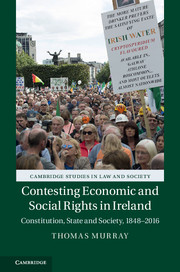Book contents
- Frontmatter
- Dedication
- Contents
- Acknowledgments
- Introduction: The Politics of Economic and Social Rights
- 1 Constitution ‘from Below’ in Ireland: 1848–1922
- 2 ‘Not Alone Personal Liberty but Economic Freedom’: Socio-economic Rights in the Making of the 1922 Irish Free State Constitution
- 3 ‘Highly Dangerous’? Socio-economic Rights in the Making of the 1937 Irish Constitution
- 4 Contesting the Irish Constitution and the World-System: 1945–2008
- 5 The Polarities of Justice and Legal Business
- 6 Contesting Property Rights
- 7 Contesting Trade Union Rights
- 8 Contesting Family, Education, andWelfare Rights
- 9 Reproducing the Value-Consensus State
- 10 Constitution ‘from Below’ in Ireland: 1945–2008
- Conclusion: Contesting Economic and Social Rights Today
- Bibliography
- Index
10 - Constitution ‘from Below’ in Ireland: 1945–2008
Published online by Cambridge University Press: 05 August 2016
- Frontmatter
- Dedication
- Contents
- Acknowledgments
- Introduction: The Politics of Economic and Social Rights
- 1 Constitution ‘from Below’ in Ireland: 1848–1922
- 2 ‘Not Alone Personal Liberty but Economic Freedom’: Socio-economic Rights in the Making of the 1922 Irish Free State Constitution
- 3 ‘Highly Dangerous’? Socio-economic Rights in the Making of the 1937 Irish Constitution
- 4 Contesting the Irish Constitution and the World-System: 1945–2008
- 5 The Polarities of Justice and Legal Business
- 6 Contesting Property Rights
- 7 Contesting Trade Union Rights
- 8 Contesting Family, Education, andWelfare Rights
- 9 Reproducing the Value-Consensus State
- 10 Constitution ‘from Below’ in Ireland: 1945–2008
- Conclusion: Contesting Economic and Social Rights Today
- Bibliography
- Index
Summary
Judge Butler: You see, there must be some social order. People cannot take the law into their own hands and what I am here for is to see that does not happen. It is distasteful for me…to have to make decisions like this but I have no option.
Denis Dennehy (Dublin Housing Action Committee): There appears to be a contradiction between the Constitution and what this injunction is asking me to do. The State has a duty to protect the family, according to the Constitution, and this injunction means the family is going to be broken up…I think the family is more important than the rights of private property.
– Courtroom exchange, 1970Distinguished by a strong focus on the state and a curious neglect of society, Irish constitutional studies have not yet attempted to see Bunreacht na hÉireann from the perspective of those constitutionalised. This omission is surprising, not least because people in Ireland, on occasion, have taken the law into their own hands. Seeing a constitution ‘from below’ denotes tracing this twofold social phenomenon whereby participants in a conflict both challenge received interpretations of a constitution and create new forms of justice. Minimally, this might involve people lobbying government and contacting media to draw attention to the gap between a constitution's expressed ideals and existing state practices. Maximally, people can take direct action to realise their aims themselves, including boycotting, striking, or squatting vacant property. Such activities forward a different vision of selfhood, citizenship, and rights, one that assumes free individuals have the capacity to manage their affairs together in a direct, ethical, and rational manner. In the Irish context, people have interpreted all manner of socio-economic rights and demands into the 1937 Irish Constitution, challenging the highly regulated space of the courtroom and the law's ideological prerequisites, and, in some cases, forming or constituting entirely new spaces, senses, and practices of justice.
The present chapter incorporates heretofore neglected civil society and social movement voices into a more complex account of constitutional and socio-economic rights development in Ireland. It is not intended to be a complete survey of every popular invocation of the 1937 Irish Constitution.
- Type
- Chapter
- Information
- Contesting Economic and Social Rights in IrelandConstitution, State and Society, 1848–2016, pp. 293 - 325Publisher: Cambridge University PressPrint publication year: 2016



